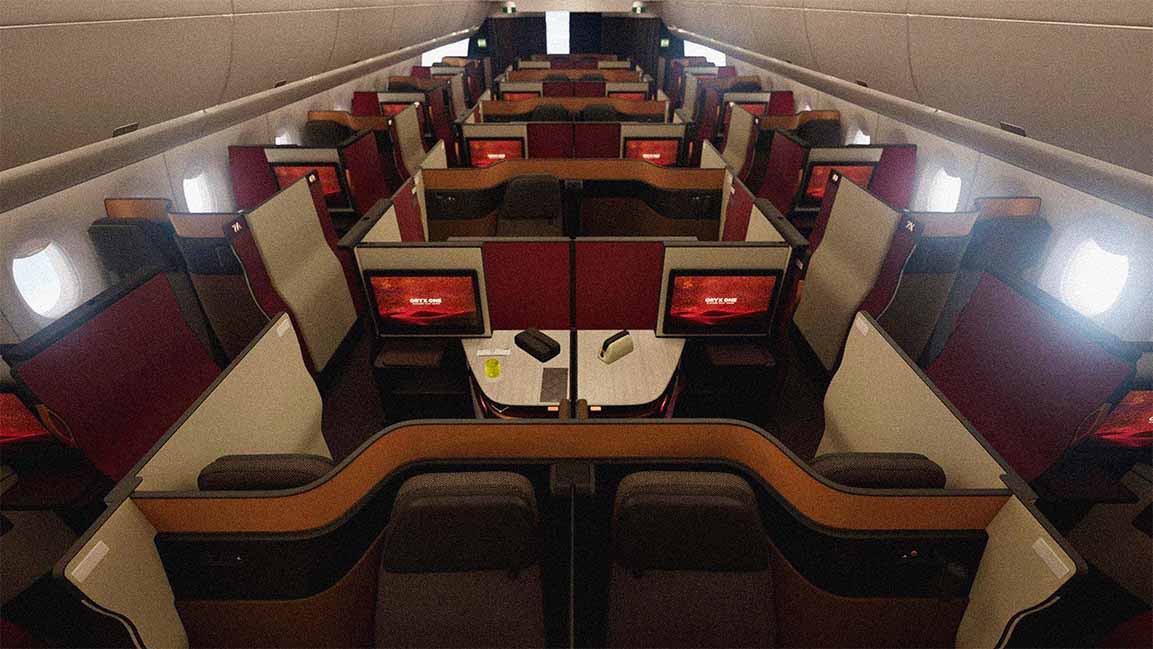How Qatar Airways is transforming air travel with the QVerse
The national carrier of Qatar is innovating its offerings by providing passengers with a unique digital experience – they can virtually tour the premium check-in area to the cabin interior of the airline’s aircraft

Sama has a pleasant smile and a cheerful tone as she welcomes you to Hamad International Airport. She can give you an immersive walkthrough of the first or business-class check-in, help you collect your boarding pass, and even explore the Qsuite, the World’s Best Business Class. But unlike any other flying experience, here you have the luxury to “try the experience before you buy” and also can swiftly change your seats and even return to the airport terminal.
Qatar Airways’ latest hire is the industry’s first-ever MetaHuman cabin crew.
When it comes to the metaverse, there is no shortage of opinions. You have tech giants who believe we’ll eventually work and socialize within immersive 3D worlds.
But look beyond those hypes, and you’ll find a more nuanced use of the technology. Companies that recognize the potential of the metaverse and understand that any success is contingent upon a handful of important, albeit elusive, business fundamentals — execution, market fit, usefulness, and timing.
You know, like every other tech product.
The airline industry has begun incorporating metaverse and virtual reality (VR) technology. Many are earmarking millions into building experiences in the metaverse, bringing VR to the physical airport, and allowing lounge visitors to entertain themselves with VR headsets before their flights.
And then we know airlines with plans to allow customers to visualize their travels and track carbon emissions.
And then there are others who are making the technology the basis of a successful, long-term business. Building it for utility rather than pursuing novelty, build applications that align with their brand and prospective customers – taking them on a virtual journey of discovery.
Qatar Airways has launched QVerse – an immersive experience for visitors to the airline’s website to explore its range of products and services before they travel.
Imagine having a MetaHuman cabin crew offering a digital interactive customer experience.
Passengers can virtually navigate the premium check-in area and the premium lounges at Hamad International Airport and explore the cabin interior – Economy and QSuite seats in the airplane, with a high-fidelity 3D virtual human named Sama presenting the unique features in the cabins through a narrated script.
Qatar Airways started laying the foundations of its immersive offerings by probing questions about its goals. And how is it better than existing legacy products? It took a platform-agnostic and value-driven approach, such as imbibing technology from Epic Games.
The development process involved conducting photographic surveys of all areas to be transformed into 3D to ensure accuracy. In addition, the airline examined the designs of the aircraft cabins and architectural maps for lounges to maintain a high level of fidelity for each environment and dimension.
“To bring the experience to life, we employ Epic Games’ Unreal Engine, the most advanced real-time 3D creation tool available to create an immersive experience for virtual reality and optimize the environments for the web,” says Thierry Antinori, Qatar Airways’ Chief Commercial Officer.
The virtual assistant, Sama, is generated using Meta-Human Creator, a cloud-based application that creates highly detailed digital humans.
Qatar Airways considers its cabin crew and the customer experience a crucial component of its success, and via Sama, it aims to showcase how its cabin crew assists customers throughout their journey.
“We were inspired to create an “always on” digital version that embodies our cabin crew’s values towards our passengers. We envision Sama to be entirely AI-driven in the future, capable of answering queries and providing assistance,” adds Antinori.
Additionally, it aims to build vertical value on top of all it offers, allowing passengers to experience virtual and augmented spaces and what they claim a “try before they buy experience,” providing a glimpse into the airline’s physical customer journey. And they incentivize their customers to visit the Qverse.
CHALLENGES IN CREATING VR EXPERIENCE
Having won the title of the world’s best airline seven times, Qatar Airways was under immense pressure to deliver an ultra-precise representation of reality by recreating the physical customer journey digitally. “
“Crafting VR content is challenging, but the true test lies in developing a utilitarian product that enhances the customer’s digital experience and boosts offline and online sales through a highly interactive VR demonstration,” says Akbar Al Baker, Qatar Airways Group Chief Executive.
And, at the risk of sounding repetitive, successful metaverse businesses will be those that address an actual need.
Many surveys highlight an appetite for more formal consumer metaverse services, like the ability to speak to a customer service representative. If a brand can meet these demands, they stand to thrive.
FUTURE OF METAVERSE IN AIRLINE TRAVEL
Virtual reality is evolving in the airline industry, and the diverse experience that the industry is venturing into through the metaverse illustrates an interest that extends beyond the technology bubble.
With time QVerse is going to be upgraded. Perhaps integrate compatibility with a VR headset that big tech is building to make its virtual platform more realistic, create customizable avatars, and much more.
Qatar Airways has a detailed understanding of the immersive technology as it aims to shape the industry’s evolution through QVerse.
“Virtual reality has the ability to level the playing field in the air travel industry, making it simpler for passengers to make well-informed decisions regarding their airline of choice and the quality of service they can expect both on the ground and during their journey,” adds Al Baker.
And as consumer sentiment is nearly as robust, likely to be more over time, as VR hardware becomes cheaper and more capable, the range of virtual experiences will grow in the air travel industry.
And, when the metaverse eventually reaches its apex of mainstream acceptance, airlines like Qatar Airways will be able to grow and dominate.
Maybe soon, NFT boarding passes in the metaverse.






































